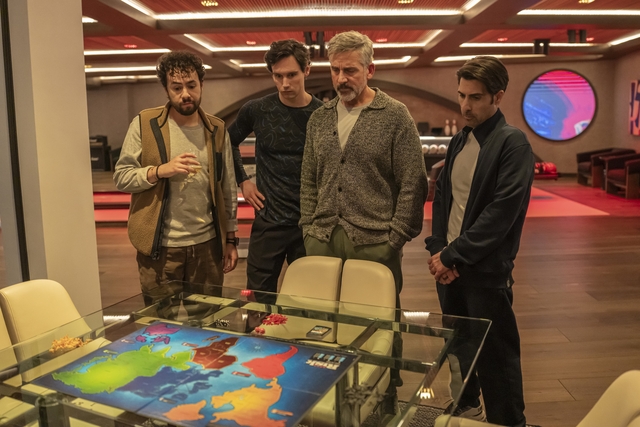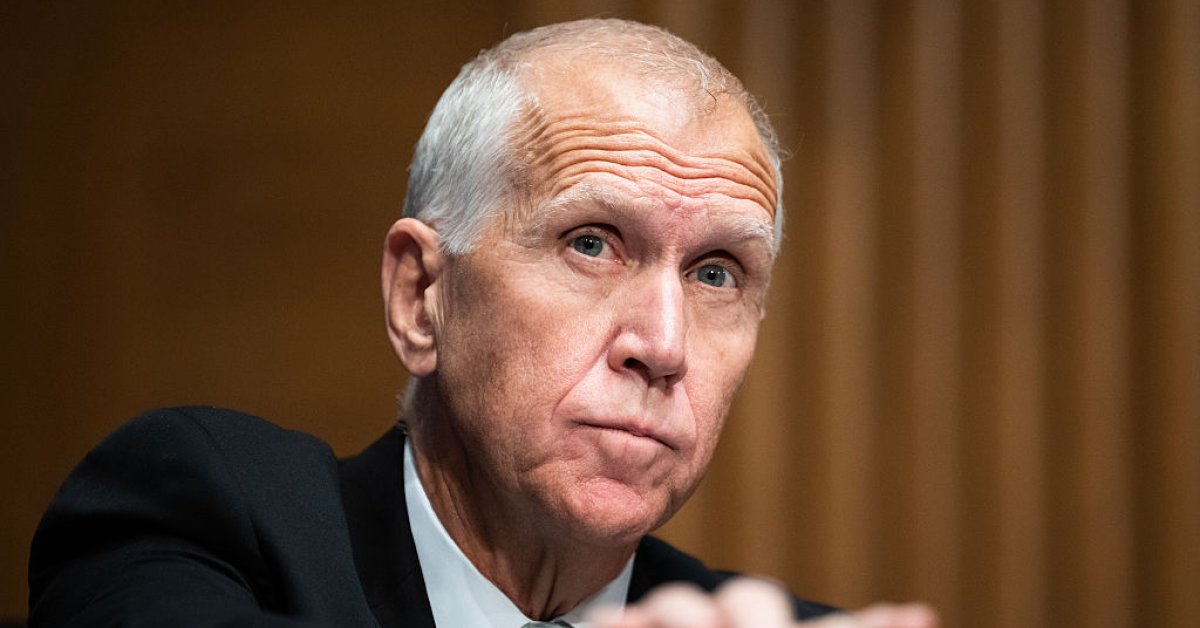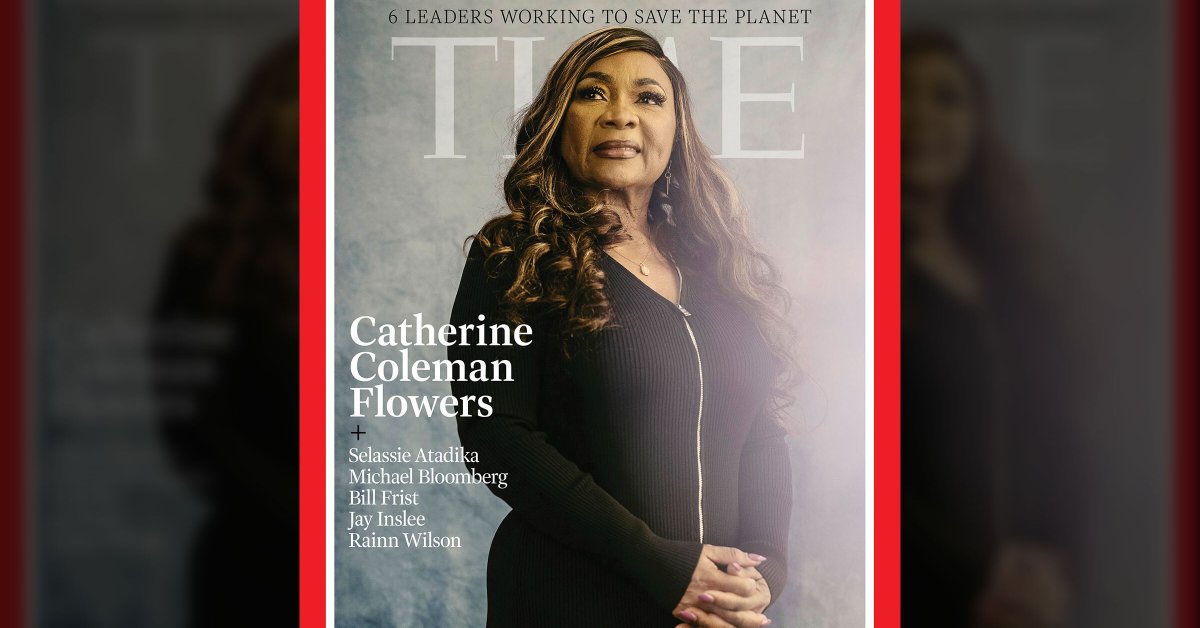We scrutinize their every public post, utterance, and gesture. But what do our most powerful and controversial tech titans—the Zuckerbergs, the Musks, the Thiels, the Altmans—have to say for themselves, and to one another, in private? Mountainhead, an HBO movie airing May 31 that was written and directed by Succession creator Jesse Armstrong, is a darkly funny, sharply scripted, and gamely acted attempt to imagine such a gathering. The trouble is, especially in the DOGE era, the guys who the film aims to indict have no masks of civility left to tear off. After successfully skewering Murdochian media dynasties, Armstrong may have found a group so transparent about its bizarre ideas and ill intentions, it’s virtually immune to satire.
Conceived, pitched, shot, edited, and finalized in just seven months—the rush reflects Armstrong’s sense of its timeliness—Mountainhead is a wild chamber piece that unfolds over a weekend in the mountains. Gotham alum Cory Michael Smith’s Venis (pronounced Venice, but the spelling is surely no accident), a fratty social media founder who’s also the richest man alive, has just rolled out an update to his platform, Traam, that, among other things, allows a user base encompassing roughly half the world’s population to easily make and share deepfakes that aren’t identifiable as such. These images immediately catalyze outbreaks of violence on multiple continents, just as Ven’s advisers warned him they would. Instead of dropping everything to fix it, save lives, and stop the planet from hurtling into chaos, like anyone who possessed an ounce of empathy would do, he takes off to drive snowmobiles and consume drugs with three other masters of the universe.
To his credit, though he doesn’t deserve much of it, one reason Ven has come to the isolated, ultramodern Mountainhead estate is to hit up Jeff (Ramy Youssef) for access to an AI Jeff has developed that could automatically filter out Traam’s most inflammatory user-generated content. More grounded in reality than his tech-utopian comrades and financially ascendant thanks to his skeptic’s foresight about crises like the one Ven has caused, Jeff is reluctant to bail out his frenemy. Both men are protégés of Randall (Steve Carell), an ideologically driven Peter Thiel type whose startup funds, obsession with transhumanism, and self-serving misreadings of philosophers from Plato to Nietzsche have shaped their careers. (Yes, Mountainhead is a reference to The Fountainhead. Jeff jokes that it was decorated by Ayn Bland.) Another Randall mentee, their host, Hugo (Jason Schwartzman), is nicknamed Souper, short for Soup Kitchen—because, with a measly $521 million in the bank, he’s the last among them still hustling to earn his first billion. Would he even have been invited on the trip if he hadn’t been the one to organize it?
Ven isn’t the only one with an agenda. Because people this cutthroat and productivity-pilled never do anything just for fun, much less in the name of friendship, their initial agreement that no business will transpire during the weekend quickly buckles under the weight of each character’s ulterior motives. Souper wants his buddies to invest in his “lifestyle super app,” which is really just another meditation app. He even rehearses a bro-tastic pitch: “If you bust a B-nut into this app, it will give birth to a unicorn.” Jeff may be the least swaggeringly arrogant of the bunch, but he clearly enjoys basking in his new-found wealth and power. Also, the trip is a convenient distraction while his girlfriend is in Mexico for what may or may not be a “f-ck party.”
Most delusional of all is Randall, who thought he’d beaten cancer but has just been diagnosed with an incurable recurrence. Instead of trying to process this news or accepting his oncologist’s optimistic suggestion that the right regimen could keep him alive for another five to 15 years, he taunts the doctor for his lack of vision (“You’re not a very intelligent person, are you?”) before dumping him on a tarmac. Convinced that technology could give him eternal, disembodied life, Randall bombards Ven with inquiries about the timeline for realizing the pipe dream of uploaded consciousness. Death, he seems to believe, is for peasants and fools. About the escalating fallout of the Traam update, he shrugs: “You’re always going to get some people dead.”
During the same conversation, early in the film, Ven casually poses a question so basic yet so alarming that it reverberates throughout the remaining hour and a half. “Do you believe in other people?” he asks Randall. “Eight billion people as real as us?” Randall: “Well, obviously not.” He’s laughing while he says it, but his eagerness to write off other people’s lives while clinging maniacally to his own suggests that this extreme form of solipsism is no joke. Like Succession, Mountainhead is directed as a comedy, each scene a confrontation between ridiculous people, but built on a sobering message about the unchecked power those monsters wield over literally everyone on Earth. In this case, said message is that guys like Ven and Randall and Zuck and Elon don’t even believe in the fundamental personhood of their fellow human beings. Armstrong implied in a recent interview that dehumanization is baked into the so-called “first principles” approach to problem solving embraced by the likes of Musk and Jeff Bezos.
Mountainhead weighs the consequences of Big Tech pseudo-mysticism in much the same way that Succession’s nightmarish Season 4 Election Day episode weighed the consequences of the media-monolith Roy family’s manipulation of American political discourse. The difference is that Succession had three-and-a-half seasons before that episode to craft the detailed psychological portraits that rendered its characters’ world-altering actions comprehensible. Because Mountainhead has less than two hours to both introduce these people and demonstrate how they bring about a sort of apocalypse, its fearsome foursome can feel a little flat, composited out of alarming news articles and bad tweets—sorry, X posts. It’s not that Armstrong is wrong about the targets of his mockery. He just doesn’t seem to have much more insight into them than the average extremely online observer who’s spent years despairing over the same headlines.
One thing that makes it tough to go deeper is that Mountainhead’s hyperverbal, dangerously uninhibited characters, like the real neo-eugenicists and blood-boy dads of Silicon Valley, don’t leave much space for subtext. (Armstrong does make the effective choice to let viewers come to our own discomfiting conclusions about how Jeff, who flaunts his moral superiority, can keep berating Ven about Traam’s body count when he’s the one who could put ego aside, flip a switch, and end it.) They look like the kind of guys who’d rather capitalize on a cataclysm of their own making, justifying it to themselves as a “controlled burn” of society’s rabble, than take responsibility for the suffering they’ve caused. And that’s precisely who they turn out to be.
Not that the movie is devoid of pleasures for Succession-heads. The dialogue is gloriously delusional (“Cancer was net-net a big positive”) and exhilaratingly obscene (the phrase “frosted Pop-Tart of Palo Alto” will haunt you), the casting ideal. Smith is the smooth, self-absorbed alpha dog; no one would make a better beta than Schwartzman. Youssef makes Jeff bro-ish enough to hang with this crowd but outsider enough to chafe at its hubris. Carell’s performance is the broadest of the bunch, but his character is also the most desperate. When Randall bellows “I take Kant really f-cking seriously!” you may not believe he actually understands the categorical imperative, but you don’t doubt he needs the others to think he does. If you like rich-people cringe, there’s Souper whining that pitted olives mean “some greasy little monster from Whole Foods has had his little fingers in them” and using lipstick to scrawl each guest’s net worth on their bare chest. If sinister twists or Roy-style bad dads do it for you, hang on past the hour mark. If you prefer your topical wit with a side of slapstick, Mountainhead’s glassy interior will facilitate that, too.
Armstrong certainly hasn’t lost his touch. It would just be more exciting to see his satirical talents directed at subjects who aren’t already in the habit of telling on themselves.








